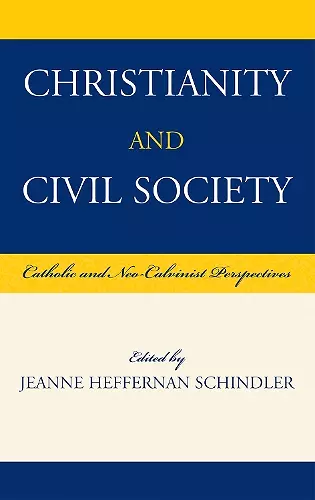Christianity and Civil Society
Catholic and Neo-Calvinist Perspectives
Jeanne Heffernan Schindler editor
Format:Hardback
Publisher:Lexington Books
Published:27th Mar '08
Currently unavailable, and unfortunately no date known when it will be back

Christianity and Civil Society responds to the crisis of American democracy as perceived by such diverse thinkers as Christopher Lasch, Michael Sandel, Mary Ann Glendon, and Robert Putnam. Despite their philosophical differences, these thinkers highlight a common theme: a decline in the institutions of civil society once held to be the vital center of the American polity. In place of these institutions—such as the family, neighborhood, church, and civic associations—one finds a disturbingly reduced socio-political stage, dominated by an abstract triumvirate of the individual, state, and market as prime actors. Whether taking their inspiration from the political theology of St. Thomas Aquinas and papal encyclicals or from John Calvin and his heirs in the Reformed traditions, the authors assembled here find the doctrinal resources of Christianity indispensable to defending the irreducible identity and value of the social institutions that serve as the connective tissue of a political community. By drawing upon a treasury of social thought little known to most Americans, Christianity and Civil Society offers a fresh vantage point from which to assess the crisis of our polity as well as the best prospects for its renewal.
Questions concerning the place of faith in American civil society have in recent elections assumed a new visibility, and many scholars have enlivened the debate by invoking the aid of institutional religion along with the institutions of family, labor unions, and other mediating entities and relations . . . Here, Schlinder gathers several unabashedly confessional essays that speak usefully to these current debates out of the particularity of Catholic social thought and neo-Calvinism. In their appeals to notions such as the common good, subsidiarity, and sphere sovereignty, the two traditions illustrate the value of attending to specific nonuniversal perspectives in public debates. * Theological Studies, December 2009 *
One of the big stories of Western social thought is the discovery of civil society—the growing appreciation of the fact that to understand the relationship between the individual and the state we have to understand the vast social ecosystem between the two poles. Jeanne Schindler's book breaks a second big story: in exploring this human rain forest, Catholic and Protestant thinkers are way ahead of the secular pack. -- J Budziszewski, University of Texas, Austin, and author of What We Can't Not Know: A Guide
ISBN: 9780739108840
Dimensions: 239mm x 162mm x 20mm
Weight: 483g
214 pages